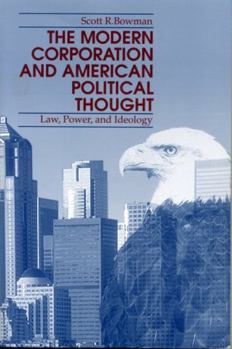The Modern Corporation and American Political Thought: Law, Power, and Ideology
Despite all that has been written about business and its role in American life, contemporary theories about the modern corporation as a social and political institution have failed to explain adequately the pervasiveness and complexity of corporate power in the twentieth century. Through an analysis of history, law, ideology, and economics that spans two centuries, Scott R. Bowman attempts to offer a complete interpretation of the way corporate power...
Format:Paperback
Language:English
ISBN:0271014733
ISBN13:9780271014739
Release Date:September 1995
Publisher:Penn State University Press
Length:448 Pages
Weight:1.41 lbs.
Dimensions:1.1" x 6.1" x 9.0"
Customer Reviews
1 rating
An ambitious work explaining corporate power.
Published by Thriftbooks.com User , 27 years ago
This is an ambitious work which investigates how ideas which justify particular interests are adopted into law and influence intellectual presumptions. Bowman wants to know how we got to the point where "increasingly, transnational corporate power, not state power, constitutes the formative agent of change in world development." He begins by reviewing how the republican tradition, which emphasized the responsibilities of citizen and statesman in maintaining social balance, was gradually replaced by the rise of classic liberalism, which affirmed the rights of the individual and justified the rise of capitalism by conceiving of economics as a matter of contracts between individuals. Economic activity came to represent the realm of freedom and the pursuit of self-interest. The coercive powers of the state were limited to preserving the realm of freedom and social efficiency. The ideological precept of corporate autonomy grew out of legal doctrines which reified the corporation as a citizen, thus, serving both to legitimize and to disguise corporate power as an inviolable part of the natural order. Corporate liberalism rose as an alternative to laissez-faire liberalism and statist socialism. Jurists moved from thinking of the corporation as an artificial construct of the sovereign to a regulated citizen. The rights of due process aided corporate power by providing constitutional rights that could be invoked against state attempts to regulate. With the rights of legal persons, came an expectation of corporate social responsibility, consistent with the ideological concept of citizenship. The western frontier and the "invisible hand" gave way to faith in technological advance and a pragmatic role for government support and regulation. Bowman's historical journey leads through exponents of the Progressive Movement such as Herbert Croly, Walter Weyl, and Thorstan Veblin who argued that corporate hegemony constituted the central problem of modern society. In place of the automatic balance of the marketplace, a conscious social balance would have to be imposed. The rights of property would be reduced but freedom would be retained through the separation of political and economic realms. Our concept of democracy shifted from the belief that sovereignty resides in the people to a more instrumental approach, dependent on rule by experts and faith in technology. At the beginning of the Progressive Movement most large corporations were controlled by the majority stockholder. With the publication of Berle and Means' The Modern Corporation and Private Property in 1932 that assumption changed and the economic/political dichotomy fell. Peter F. Drucker, Adolph A. Berle and John Kenneth Galbraith "viewed the corporation as an autonomous or self-sufficient entity capable of generating its own capital and therefore no longer dependent on the capital markets." The objective of managerial theory shifted from preserving democra





